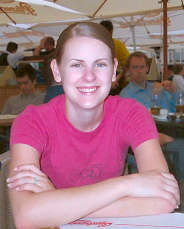COL Student’s Battles for the Innocent Receive Well-Deserved Recognition
March 17, 2006

Lindsay Reese
Lindsay Reese often felt like she was investigating a crime scene as she read hundreds of prisoners’ letters and trial transcripts as an intern at the Georgia Innocence Project.
The second-year Georgia State University College of Law student is among many of her peers who have worked at the nonprofit organization dedicated to helping individuals convicted of crimes they did not commit. And that work is not going unnoticed. The Georgia Innocence Project and Georgia State law student Reese were featured in the February 2006 edition of Atlanta Magazine.
“My work at the Innocence Project helped me think more like an investigator,” Reese said. “When you read a trial transcript, it really comes alive and it often makes you feel like you’re there. Because of the nature of DNA, it’s almost entirely rape and murder cases that you’re working with. You have to be prepared because some of the material is difficult to read.”
In many cases, DNA testing was not available at the time of conviction, so prisoners write letters to the Innocence Project, noting whether blood, hair, saliva or other forms of DNA evidence exist that could exonerate them.
Elina Gritsiv, Carolyn Altman and Ashley Tyson are current Georgia State law students interning at the Innocence Project. The project was actually created by another pair of Georgia State students in August 2002. Aimee Maxwell, director of the program, is a 1987 College of Law graduate.
“I’m a little concerned so many people are found to be innocent,” Maxwell commented. “As of last month, 174 people have been exonerated across the country. I think what that shows is that we have a great criminal justice system, but human beings are running it and humans make errors. I think it’s pointing out really important reforms that need to happen.”
In December 2005, the Georgia Innocence Project helped free Robert Clark, who spent 16 years in a Georgia prison for a rape he did not commit. In August 2004, the project exonerated Clarence Harrison, who wrongly served nearly 18 years of a life sentence for rape, robbery and kidnapping.
Although Reese’s internship has ended, she has held on to the case of Ira White, who is serving two life sentences plus 60 years for breaking into a woman’s apartment, raping and sodomizing her. Reese has researched the case, now all she can do is wait while the case is in the hands of the Georgia Bureau of Investigation.
“Law students are essential to what we do because they’re the folks doing the research on these cases,” Maxwell added. “They’re completely responsible for the progress of their assigned cases and it paints a really good picture of what they will be doing as lawyers. And for most prisoners it’s the last hope in a criminal case.”
Reese is now helping raise money so other law students can work at community agencies, like the Georgia Innocence Project, through her role as auction chair of the Public Interest Law Association (PILA). The student organization promotes public interest law, which aims to defend the rights of those who go unprotected because of economic disparity, lack of education or some form of prejudice.
“We have raised more than $14,000 this year through our annual auction this past month,” Reese said. “The funds enable law students to intern during the summer at local community agencies including the Innocence Project, the Georgia Public Defender Standards Council and the Juvenile Court of Fulton County.”